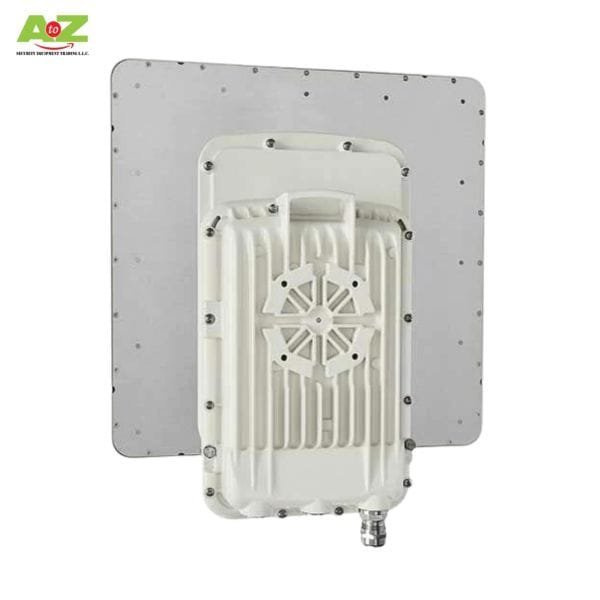Description
Features of ACCESS POINT-PTP670
- RF Bands: 4.9 to 6.05 GHz, wide-band operation (allowable frequencies and bands are dictated by individual country regulations).
- Channel sizes: Depending on national laws, 5/10/15/20/30/40/45MHz channels.
- Maximum spectral efficiency of 10bps/Hz.
- Channel selection: either manually or using dynamic spectrum optimization. selectiothat is made automatically at startup and ongoing self-optimization to reduce interference.
- Up to 27dBm maximum transit power.
- System Gain: Using an integrated antenna, up to 164dB.
- Fast Preemptive Adaptive Modulation has 13 levels of modulation and error correction (FEC) coding, ranging from BPSK to 256 QAM dual-payload MIMO.
- Time Division Duplex (TDD) and adaptive or fixed transmit/receive duty cycles are examples of the duplex scheme. Where permitted by regulation, split frequency operation permits for distinct transmit and receive frequencies. TDD synchronization with the PTP-SYNCH Module is optional.
- Integrated 23dBi Flat Panel Antenna.
- Range: 155 miles
- FIPS-197 compliant 128/256-bit AES encryption for security (optional) Identity-based user accounts, SNMPv3, HTTPS customizable password policies. User authentication, RADIUS support, event management, and optional syslog logging are all included. Recovery from disasters and vulnerability management
- IEEE 802.3 is the Ethernet protocol.
- 1-3 milliseconds of latency in one direction.
- Extended QoS with support for up to 8 queues.
- Layer 2 and Layer 3 IEEE 802.1p, MPLS, and Ethernet priority packet classification
- Line rate (>850k packets per second): Packet performance
- Synchronous Ethernet; IEEE 1588v2 Timing Transport
- skeletal support Jumbo frames up to 9600 bytes in PTP mode, 2000 bytes in HCMP mode
- Flexible I/O: Two copper Gigabit Ethernet ports Data and PoE power are input on Gigabit Port 1. 802.3at PoE output port on Gigabit Port 2. One SFP port supports single-mode and multi-mode fiber. or gigabit copperThe ACCESS POINT – PTP670 T1/E1 TDM Support offers the following Ethernet options: (8) T1/E1 TDM (Network Indoor Unit (NIDU)). DC power input with G.823-compliant timing and support for AC+DC Power Injector output.Network administration: in-band and out-of-band administration (OOBM)
- IPv6/IPv4 dual-stack management capability for system administration. Browser-based web access via HTTP or HTTPs/TLS3, SNMP versions 1, 2, and 3, MIB II, and the proprietary PTP MIB..
- Installation: Integrated audio and graphics link optimization aid.
- Mobile Modules Master: 8 maximum nodes
- Channel 20 and 40 MHz of bandwidth
- 8bps/Hz Spectral Efficiency 850K pps is the maximum line rate packet per second.
- 2 to 4 ms in the HCMP Mode for latency (typically)
- 305 x 305 x 81mm (12 x 12 x 3.2 inches)
- Weight, with the bracket, is 4.1 kg (8.95 lbs).
- Operating Temperature: -40 to 140°F (-40 to 60°C), including sunlight
- Water-Dust Infiltration Wind Speed Survival: 200mph Protection: IP66 and IP67 (322kph)
- Power Supply: 0 to 40°C to 104°F 90-240VAC, 50/60Hz, 35W
- Maximum power consumption is 30W. (up to 70W with 802.3at device on auxiliary products)
- Protection and Safety: CB clearance for Global ACCESS POINT – PTP670, UL60950-1,
- IEC60950-1, EN60950-1, CSA-C22.2 No. 60950-1
- Radio: 5.x GHz: FCC Part 15, sub-parts 15C and 15E; RSS 210 Issue 8; EN 302 502; EN 301 893 Eire ComReg 02/71R1; UK Approval to IR2007; EMC: Europe – EN301 489-1; 4.9 GHz: FCC Part 90Y, RSS-111.






Reviews
There are no reviews yet.